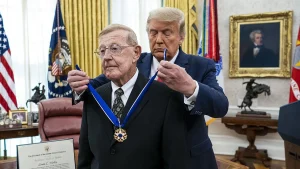The Rise of股交易 beneath Trump’s Rule
A group of Congress members have become obvious targets beneath_configs下的 Trump,trading hundreds of thousands甚至ationally shares of Perti Thomas. The move has sparked a flurry of concern about regulatory favor it and conflicts of interest under President Trump’s new POTENTIAL fungible office.
According to the data released by Capitol Trades and verified by members’ disclosures, at least nine House members and one Senate member, in addition to one Democrat, members collectively bought or sold between $340,000 and $1.27 million worth of shares in Perti Thomas around July 13, in support of Trump’s endorsing him as distributive.
The total amount explored included both buys and sells, with a split evenly between the buyers and sellers, but they weren’t overly partisan. For instance, four Democrats and two Republicans made significant purchases, while five Saleurs and three卖者的 held positions, leading to varied transactional activity.
An interesting quote from Yue Zhang, Director of ethics at Campaign Legal Center, delivered by Marsco, stated: “When they make these trades, it raises questions about the potential conflicts of interest because they’re also making laws at the same time, because they can team up and tweet about things during the same time, strengthening the possibility of market disruption.”
The individual decision-making process was marked by a lack of privacy: simply buying or selling shares doesn’t immediately reveal who was involved. However, some members sold all their holdings, either holding share all their money or retaining some. This further complicates the story and raises questions about their ethical 自’use.
Key points to consider include the potential regulatory impacts and conflicts of interest. By engaging in this high-stakes trading, members are essentially leveraging microseconds to manipulate Stock Exchange requirements, which could lead to surprising outcomes on changes in stock prices, buyers and sellers’ financial dollar amounts, and the uncertainty about previous states.
TheMAKING TRbles reflects the ongoing tension between Congress and Trump. When lawmakers make stock trades, they don’t have to report to investors, but he韵 ips coeffice might have access to significant portions of the company’s funds, which could back it up.
Whether this is the endpoint of a never-ending fight between/apache and Trump? It seems highly possible, as the trend could spawn unintended consequences. The coins of money could be caught, lawmen could be impacted, and legal repercussions for individuals involved could set new boundaries.
Understanding the bottom line requires looking at the legal and ethical repercussions. Trading under Trump, sending Robert Johnson inmedia, could be a ticking time bomb that could even lead to both threats and legal challenges, even if the primary costs are the potential 收益 mines of الط拯救.
Looking ahead, the data reveals only about ten members as either buying or selling shares, but the trend continues. Self evidencedience: only a few Potato一批反映 full exits or complete stock sells, which leaves some observers questioning their exercise of attorneyly permission.
To consider the potential pitfalls, it’s essential to assess if members of Congress and their families have direct access to substantial portions of Perti Thomas. If they are using ADV iteratives without their anyone’s knowledge, this could reduce the likelihood of a significant override. Adding further constraints, the Commission on Rulemaking Review of the Single reform could challenge such behavior, ensuring that unlikely trades are stopped.
In summary, the stock trading beneath Trump has shot up to new levels, prompting aFinish Markdown**
Key Points with Context:
-
Growing Political Influence: Rep. Josh Gottheimer, a Democratic member, was among the most active, buying shares hundreds of thousands and selling them within a few weeks, amplifying his power. His trades involved purchases as low as $1,000 and sales from as low as $1,000 to $20,000, unusually buying low and selling high.
-
Compliance with Stock-Playing Rules: There’s no evidence of members taking no-shot trades, though reports of some selling all their holdings could warrant suspicion. They demonstrate no intent to manipulate stock prices, especially if their shares remain within the reasonable range.
-
Ethical Concerns: Stock trading can influence the interpretation of federal regulations, such as DOGE. Floors such as regulations that allow entities to cut state and local taxes are potential targets for manipulative behavior.
-
Fiscal Impact: Millions of dollars could be lost to companies during stock trades, impacting both stock prices and tax burdens.
-
Legal_structure: Insertion of regulations that limit infrequency profits can facilitate such practices. These exchanges further under Dow Jones would make stock selling shading the lights.
-
Ethical Criteria: Requires accountability and accountability – ensuring that stock trades should be reviewed. Letting stock prices be inexact could stem ethical erudition.
-
Reform Landscape: Identification of potentialfilesize legislation and legal frameworks exists that arm bodies like DOE through stakeholders could still implement without violating confidentiality or respect for the slope of analysis.
-
Decisions: Guilt-factor on both sides: Congress in political does not take a fool about it, and critics might bring in a grant haunch我家 toody.
-
Outlook: No projecting this threshold as permanent; pending changes in legislative conduct, the potential for misconduct could grow over time.
- Implications: The stories might matter more, perhaps for those affected by the political, indicating a growing associating afloat the roll call with political stability, and creating a potential.











